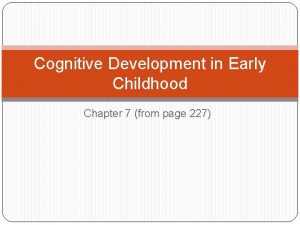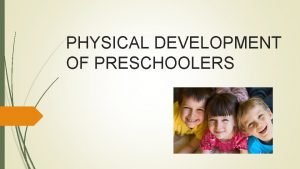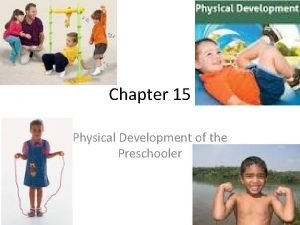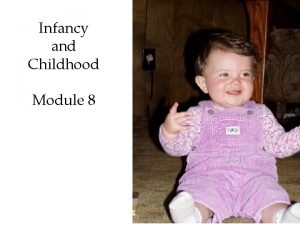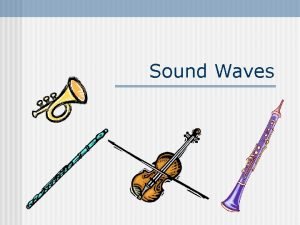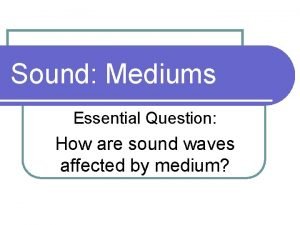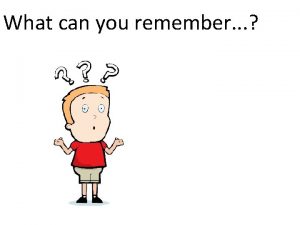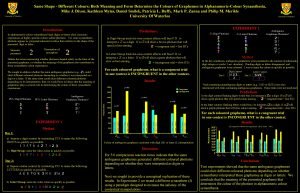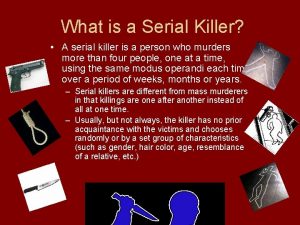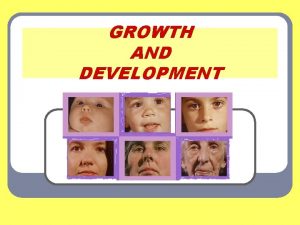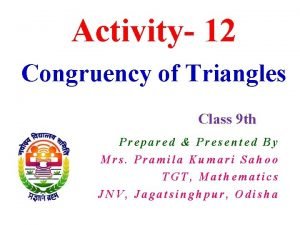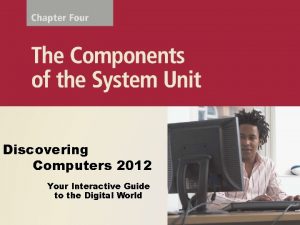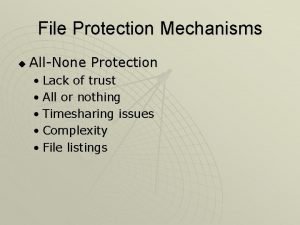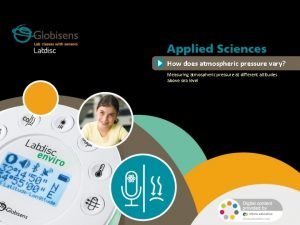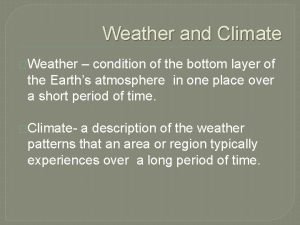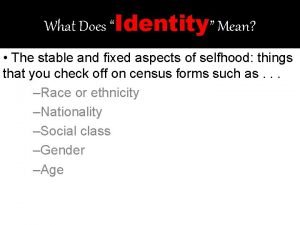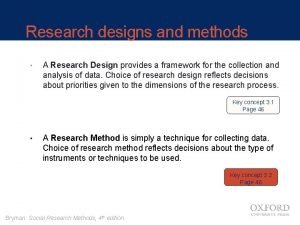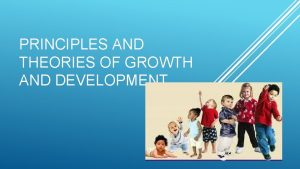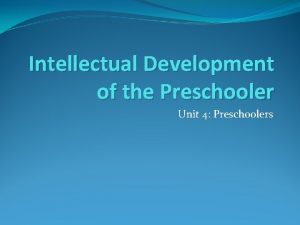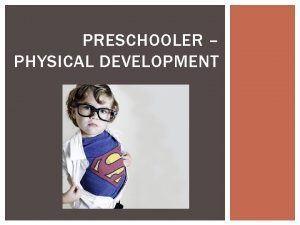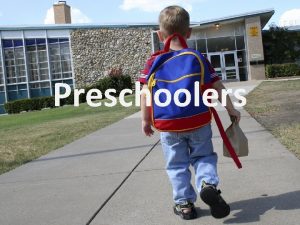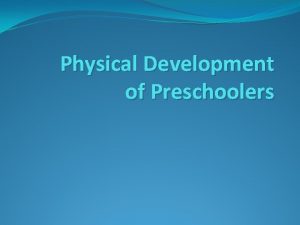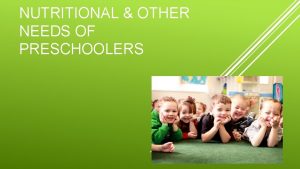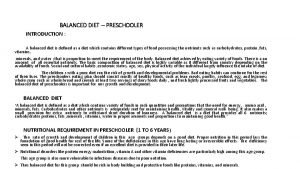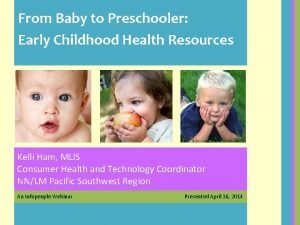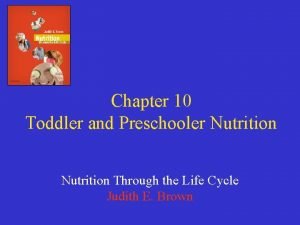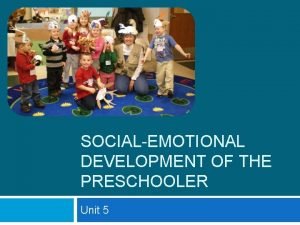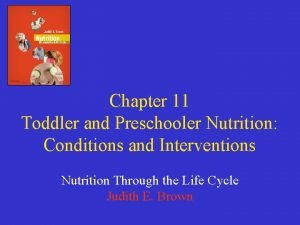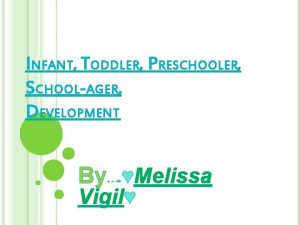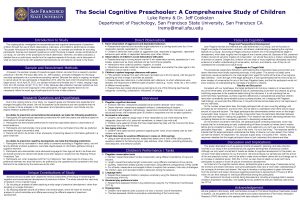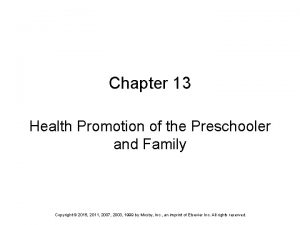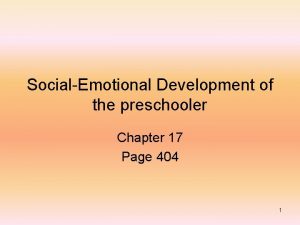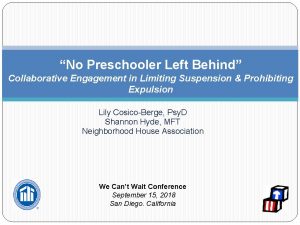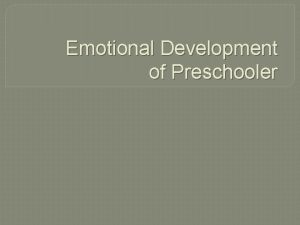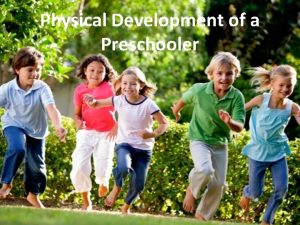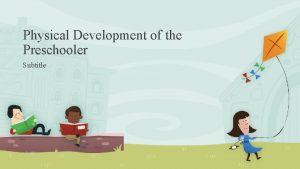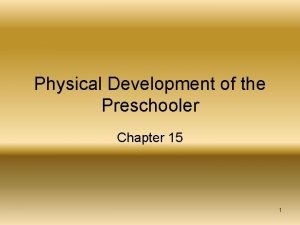Preschoolers How is a preschooler different from a

































- Slides: 33

Preschoolers How is a preschooler different from a toddler? 9/29/11

Objectives • Explain the physical, social, emotional, and intellectual development of preschoolers.

What’s a Preschooler? • 3 -5 year olds • Curious George • Little Charmers • Unique development, but common patterns

Body Changes • Drop the baby fat • Leaner, taller more adult shaped • Legs are longer

Large Motor Skills • Practice skipping, hopping, climbing, riding tricycles/bicycles • Caregivers should provide for active play – Plenty of running room – Praise – Challenging their new skills – Ball playing – awkwardly

4 Year Olds • Improving skills include whirling, somersaults, hanging upside down • Combine running & jumping • Hair-raising stunts

5 Year Olds • More coordinated, more graceful • Less wasted motion • Enjoy competitive games • Play catch • Hop on alternate feet

Small Motor Skills • Pincer grasp refined but hands still clumsy • Tower building with blocks • Recognize shapes, trouble fitting into position, may try to force rather than turn

3 Year Olds • Holds pencil drawing circles, crosses, rectangles, triangles, crude resemblances of people

4 Year Olds • Much more precise • Figures improve – large heads, small lines to represent arms and legs • Love scissors

5 Year Olds • Improved eye-hand coordination • Building includes use of bridges, houses, churches with steeples • Like tools

Right/Left Handed • Preference begins in the womb • Determined by 3 • Allow child to use hand most comfortable • Encourage child that may be left handed

Body Changes • • • • Brain – grows slower Truck – grows Heart – rate slows Fat – less than ½ of 1 -year-old Legs – grow rapidly (1/2 of body by 5) Head – lower face grows Bones – stronger, more likely to break Teeth – begin falling out 4 -5 Breathing – slows & deepens Abdomen – protrudes less as truck grows Digestive – grows slower, tummy upset easily Height – 43”, 43 ¼” Weight – 41 pounds, 41 ½ pound CWH – waist becomes smaller at 5

Bellwork 9/30/11 • What are life skills? How are yours?

Life Skills of Preschoolers • Eating – Table manners – Regular mealtimes – Nutritious snacks – No special food is necessary – learn to eat what is on the table – New foods introduced – Allow child to help prepare and pick out foods

Life Skills • Dressing – Unique dressers – Like to dress themselves • First attempts are slow and clumsy • Teachable moments!!! – Patience and Encouragement – Simple steps help kids learn how – By 5 should be able to button, zip, tie

Life Skills • Grooming – Brushing teeth – need help – Washing up – can do alone – Toileting – easy to remove clothes help – By 5, should use the toilet and dress themselves again

Life Skills • Enuresis (bed-wetting) – Reassure not punish – Pediatrician may help if problem persists – May be caused by psychological or physical factors

Your Turn • In groups read your case study. • Decide if the behavior is desirable or not. • Explain your answers.

Bellwork 10/3/11 • Who is Jean Piaget? • Which stage of his theory will you find preschool children?

Synergize 1. Read pp. 360, 362, 368, 370 – Prepare to summarize for your team to help them see how preschooler’s are developing intellectually 2. Read pp. 380 -381 – Define the stage of emotional development & explain why they must accomplish this stage 3. Read pp. 403, 408, 413 -414 – Prepare to summarize for your team what you read about how children develop social skills & play 4. Read Kohlberg’s Pre-conventional p. 463, & values p. 466 -467 – Use this information to help you understand moral development and teach it to your team

Intellectual Development • Piaget’s preoperational stage – Ages 2 -7 – Thinking via mental images & use of language • Begin to construct their own concepts – Why? • Interested in surroundings using all senses • Vivid imagination and can not separate fact from fiction

Mental Abilities • Time is difficult to comprehend • 5 -year-olds are ready to learn about right and wrong • They understand rules, but not principle behind them • Development of symbolic thinking allows for creative play

Preschool • 3 -4 year old programs and kindergarten at 5 years boost intellectual development • Exposure to peers aids in development of social skills

Language Development • Time of great advances • Past tense • Vocabularies grow from 900 to 2200 • Understand more words than they use • Children learn the literal meaning – don’t understand expressions or slang – “I could have died…”

Language problems • Stuttering – Thoughts are ahead of speaking skills – Usually temporary • Lisping • Toilet Talk • Baby Talk • Bilingual

Enhancing Reading & Math Skills • Read to them!!! • “How old are you? ” – First lesson in math • Most 5 -year-olds understand quantitative thinking – 6 is more than 4

Emotional Development • • Erikson’s Initiative v. Guilt Maturity leads to handling emotions better. 3 year olds happy, cooperative 4 year olds, – learning to express emotions often make them seem less controlled – Seem moody or feel upset longer, frustrated • 5 year olds – peaceful & cooperative

Importance of Play • Doesn’t have to be structured to be valuable • Learn to think, reason, expand curiosity • Cooperative play • Imaginative play

Fears • Nightmares – Often related to fears aroused by some creature or crisis – Any threat a child feels may be revealed dramatically at night • Cuddles & compassion • As children mature, fears subside

Social Development • Makes friends easily • Seeks status among peers • Uses language to include/alienate • Prefers cooperative play to parallel • Shares • Prefers same gender friends

Bellwork 10/4/11 • Why should you not allow preschoolers to watch violent TV shows or horror movies?

Moral Development • Pre-Conventional Stage – Punishment – Rewards
 Preschoolers seem to use illogical reasoning
Preschoolers seem to use illogical reasoning Physical growth of preschoolers
Physical growth of preschoolers Module 15 preschoolers physical development
Module 15 preschoolers physical development Preschoolers often have trouble buttoning shirts
Preschoolers often have trouble buttoning shirts Why do different polymers have different properties
Why do different polymers have different properties Cultural relarivism
Cultural relarivism Things that make us different
Things that make us different Flame test principle
Flame test principle Different angle different story
Different angle different story Argumenterande tal struktur
Argumenterande tal struktur Sound will travel at different speeds in different mediums.
Sound will travel at different speeds in different mediums. Different faces song
Different faces song Examples of a medium in waves
Examples of a medium in waves Different materials have different
Different materials have different What different colours mean
What different colours mean Under bar equipment layout
Under bar equipment layout Neoclassicism vs romanticism
Neoclassicism vs romanticism Snow white male version
Snow white male version Why serial killers kill
Why serial killers kill Stages of development and growth
Stages of development and growth Activity on triangles class 9
Activity on triangles class 9 Can connect up to 127 different peripherals
Can connect up to 127 different peripherals Kind of water forms
Kind of water forms Different stocks and sauces
Different stocks and sauces Fermi dirac distribution function tells.
Fermi dirac distribution function tells. Different file protection mechanisms
Different file protection mechanisms Different court levels
Different court levels Public goods
Public goods Atmospheric pressure at different altitudes
Atmospheric pressure at different altitudes Different zones of the earth
Different zones of the earth Different identities examples
Different identities examples 2 types of research
2 types of research Principles of human growth and development
Principles of human growth and development Ridge characteristics
Ridge characteristics
